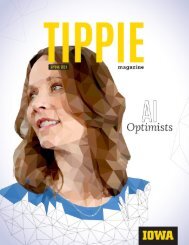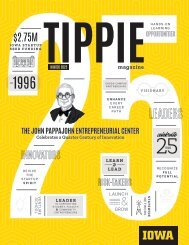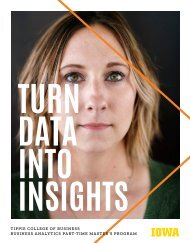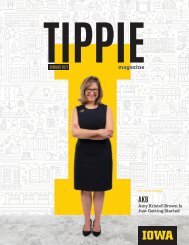Tippie Magazine (Fall 2023) - Tippie College of Business
Tippie Magazine, a semiannual publication for alumni and friends of the Tippie College of Business, includes feature stories, alumni updates, and the latest news from the college.
Tippie Magazine, a semiannual publication for alumni and friends of the Tippie College of Business, includes feature stories, alumni updates, and the latest news from the college.
Create successful ePaper yourself
Turn your PDF publications into a flip-book with our unique Google optimized e-Paper software.
2<br />
ADAPT TO WORK<br />
3<br />
EMBRACE LIFELONG<br />
4<br />
WITH A.I.<br />
LEARNING.<br />
“New technology is always scary,”<br />
says Beth Livingston, Ralph L.<br />
Sheets Associate Pr<strong>of</strong>essor <strong>of</strong><br />
Industrial Relations. “This is not the<br />
first new technology that has come,<br />
nor will it be the last, but if you<br />
can approach A.I. as a tool instead<br />
<strong>of</strong> something that could upend<br />
your whole life, it makes it feel like<br />
something manageable.”<br />
In most cases, A.I. technology will<br />
only eliminate or change parts<br />
<strong>of</strong> a pr<strong>of</strong>ession rather than doing<br />
away with them entirely, posits<br />
Livingston, who is currently a<br />
co-principal investigator on a<br />
National Science Foundation grant<br />
researching how automation will<br />
affect clerical work. It’s incumbent<br />
for pr<strong>of</strong>essionals to learn as much as<br />
they can about it—and harness it for<br />
their own purposes.<br />
“Learn to surf the wave and<br />
become adaptable, and you’ll be<br />
able to leverage this technology,”<br />
Balakrishnan says. He recommends<br />
that pr<strong>of</strong>essionals keep an open<br />
mind and learn how the technology<br />
works, especially the A.I. tools<br />
that are commonly used in their<br />
pr<strong>of</strong>essions.<br />
Some may even be surprised that<br />
leveraging this technology makes<br />
their jobs more enjoyable, since it<br />
can help reduce the time spent on<br />
monotonous or tedious parts <strong>of</strong> a<br />
job. Consider how A.I. can simplify<br />
the process <strong>of</strong> accounting to<br />
ensure disclosures are appropriate<br />
or compliance reports are filed,<br />
Balakrishnan says.<br />
Learning to adapt to A.I. may mean<br />
investing in formal educational<br />
upskilling in areas like prompt<br />
engineering, says Fan. It’s critical<br />
to understand how to manage,<br />
interpret, and analyze data<br />
produced by A.I. systems.<br />
Even <strong>Tippie</strong> faculty are engaging in<br />
continuous learning to work with A.I.<br />
and machine learning. Ashish Tiwari,<br />
the Henry B. <strong>Tippie</strong> Research<br />
Pr<strong>of</strong>essor <strong>of</strong> Finance, says that he<br />
learned to work with Bayesian<br />
machine learning methods to aid his<br />
academic research about improving<br />
performance benchmarking and the<br />
evaluation <strong>of</strong> hedge funds. “It helps<br />
to significantly reduce the errors<br />
in terms <strong>of</strong> performance evaluation<br />
and helps improve predictions<br />
around fund failure,” he says.<br />
“COMPUTERS<br />
HAVE YET TO<br />
CAPTURE HUMAN<br />
INGENUITY,<br />
CREATE NEW<br />
THINGS FROM<br />
NOTHING,<br />
AND BUILD<br />
RELATIONSHIPS<br />
WITH OTHERS.”<br />
—BETH LIVINGSTON<br />
“This is a critical time to cultivate<br />
deeper expertise in your field<br />
and broad knowledge across<br />
different domains,” says Fan. The<br />
combination <strong>of</strong> these “T-shaped”<br />
depth and breadth skills will best<br />
equip you to collaborate with<br />
A.I. systems.<br />
LEAN IN TO YOUR<br />
DIFFERENTIATOR:<br />
YOUR HUMANITY.<br />
There’s at least one thing that<br />
chatbots don’t have that people do—<br />
and that’s humanity. At the end <strong>of</strong><br />
the day, A.I. are tools to augment or<br />
support jobs, Fan says. They cannot<br />
make ultimate decisions or be held<br />
responsible for them.<br />
“We as human beings have to be the<br />
decision-makers,” Fan says. “We<br />
are responsible for every decision<br />
we make.”<br />
People must be in charge <strong>of</strong><br />
how to use the information and<br />
content that A.I. systems like<br />
ChatGPT create, and they have<br />
to be responsible for the ethics<br />
<strong>of</strong> the tool, when it comes to bias,<br />
discrimination, and objectivity,<br />
for instance.<br />
Livingston also recommends that<br />
pr<strong>of</strong>essionals “… recognize what<br />
computers have yet to be able to do,<br />
which is capture human ingenuity,<br />
create new things from nothing,<br />
and build relationships with others.”<br />
Ultimately, she suggests focusing<br />
on the parts <strong>of</strong> your pr<strong>of</strong>ession<br />
where you, in your humanity, can<br />
add value.<br />
That’s something that technology<br />
can’t replace… at least not yet. •<br />
GO DEEPER<br />
A.I.-Pro<strong>of</strong> Your Career<br />
with Patrick Fan and Beth Livingston<br />
Noon-1 p.m. CT, Wednesday, Nov. 8<br />
Register at tippie.uiowa.edu/ai-webinar<br />
DYK?<br />
300 million jobs could be affected by latest wave <strong>of</strong> A.I., according to Goldman Sachs.<br />
11

















